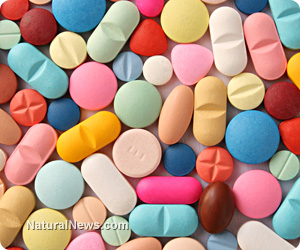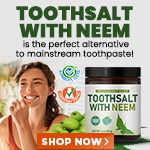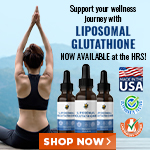
How Google protects the financial interests of Big Pharma
Wednesday, March 12, 2014 by: J. D. Heyes
Tags: Big Pharma, Google, financial interests
- Newly released JFK files reveal Pentagon's role in creating Lyme disease and covid in the same lab
- Dr. Suzanne Humphries makes bombshell appearance on Joe Rogan podcast, exposing vaccine industry deception back to POLIOMYELITIS
- L.A.'s rebuilding nightmare: Only 4 permits issued after fire destroys 6,000 homes
- Discovery of vast underground city beneath Giza pyramids challenges human history
- Black cumin seed oil emerges as a powerful ally against breast cancer and chronic inflammation
- Catastrophic 7.7 earthquake devastates Myanmar and Thailand; death toll could reach 100,000
- AI breakthrough slashes celiac disease diagnosis time from months to minutes
- The hidden battle in your glass: How A1 and A2 milk could shape your health
- Sugar-free deception: Artificial sweeteners hijack hunger signals, fuel obesity epidemic, study warns
- Europe braces for WAR as EU urges citizens to STOCKPILE FOOD, in latest provocations with Russia
- Thomas Massie’s Dual Loyalty Disclosure Act aims to restore American sovereignty by cracking down on foreign influence in Congress
- Putin vows to 'finish off' Ukraine, accuses West of prolonging the war
- Aluminum pollution: A silent threat to human health
- Tesla owners under siege: Road rage, vandalism and political backlash fuel fear among drivers nationwide
- Kiss Your Genetic Privacy Good-Bye! 23andMe Gets Green Light to Sell Your Intimate Genetic Details to Anyone They Want
- Chaos in Amsterdam: Five injured in broad daylight knife attack near Dam Square
- "Feel G.O.O.D. Gut Health Program" on BrightU: Dr. Basima Williams introduces the Feel-Good Plate Method
- Trump's 25% auto tariffs: A bold move to strengthen U.S. manufacturing despite short-term challenges
- Newly released JFK files reveal Pentagon's role in creating Lyme disease and covid in the same lab
- Analysis: The coming economic collapse, a mass uprising and Trump's three secret weapons to halt the growing revolt
- Trump nominates VACCINE ZEALOT Susan Monarez to lead the CDC, sidelining RFK Jr.'s reform efforts
- Trump's greatest betrayal so far: Accelerating Middle East wars, silencing dissent, and serving Zionist masters
- Dr. Mike Yeadon releases 15-minute testimony - WATCH - about genocidal intent of COVID “vaccines”
- Festive flavors: The sweet history, nutritional profile and health benefits of pecan pie
- Elon Musk: Aliens could be here on Earth RIGHT NOW
- Big Pharma's $8 Billion bribery scheme exposed: how doctors are pushed to prescribe junk science, not heal
- 5 Simple steps to boost your brainpower: How to strengthen executive function in a distracted world
- Trump reverses course on Gaza plan, says “nobody is expelling Palestinians”
- A lack of integrity in Academia: Harvard professor found GUILTY of fraudulent research to promote CRT theory
- Reclaim your health: How midlife exercise reverses years of inactivity
- Survival 101: Effective EMF blocking techniques
- Florida takes a stand: DeSantis proposes permanent ban on mRNA vaccine mandates
- Sugarcane extract superior to cholesterol-lowering drugs?
- California's social media censorship law struck down: A victory for free speech or a threat to online safety?
- OpenAI whistleblower who dissented against how the company trained ChatGPT found dead
- EPA advisor admits the agency is funneling billions to climate groups ahead of Trump’s return to White House
- EPA advisor admits the agency is funneling billions to climate groups ahead of Trump’s return to White House
- Newly released JFK files reveal Pentagon's role in creating Lyme disease and covid in the same lab
- California's social media censorship law struck down: A victory for free speech or a threat to online safety?
- Dr. Mike Yeadon releases 15-minute testimony - WATCH - about genocidal intent of COVID “vaccines”
- The Health Ranger releases “Vaccine Zombie” song and music video, using AI-animated zombies for the music video
- The pandemic as a tool for INDOCTRINATION: Understanding “The Indoctrinated Brain” by Dr. Michael Nehls
- Florida takes a stand: DeSantis proposes permanent ban on mRNA vaccine mandates
- “Why we influenced the 2020 elections”: Facebook files reveal the coordinated effort to bury the Hunter Biden laptop story
- Mike Adams releases country western hit single: Goin’ Back in Time is Comin’ Home
- Mike Adams releases music poetry sensation: A Child of God
- Unpacking the Lies That We’ve Been Fed – new song and music video released by Mike Adams, the Health Ranger
- Michigan sheriff announces criminal investigation into 2020 election crimes, Dominion Voting Systems
- Migrants are taking advantage of recent hurricanes to scam residents and loot their homes
- House Intelligence Committee calls for the ARREST and PROSECUTION of Dr. Anthony Fauci
- RFK Jr. clears key hurdle: Sen. Susan Collins backs controversial HHS nominee, signaling a new era for health policy
- Rep. Nancy Mace introduces bill to ban biological males from female facilities on federal property
- Peter Rost exposes Big Pharma corruption in his book “The Whistleblower: Confessions of a Healthcare Hitman”
- Mike Adams releases new song and music video: Nothing More Disgusting Than a Globalist
- Red Cross issues warning to stop blood plasma donations from vaccinated people
- Scientists confirm: GENIUS brain function can be spontaneously unleashed in humans without any apparent cause
- EPA advisor admits the agency is funneling billions to climate groups ahead of Trump’s return to White House
- HYSSOP: What research reveals about the health benefits of this ancient holy herb
- Two containers with completed ballots fall out of truck in Florida
- Fully vaccinated about to see “tsunami” of illness and death, warns virologist
- Global leaders unite to clamp down on “misinformation” with UN-backed Cascais Declaration
- BREAKING: 2025 NDAA authorizes mandatory military draft of WOMEN across America… as Pentagon pursues global NUCLEAR war with both Russia and China at the same time
- Michael Yon warns of a ZIONIST TAKEOVER in Trump’s second administration
- BOMBSHELL: DNA testing kits are a SCAM to develop ethnic-specific bioweapons
- Ozempic and Wegovy weight loss drugs are injectable LIZARD VENOM PEPTIDES that may unleash a devastating wave of organ failure… side effects align with symptoms of SNAKE BITES
- Israeli soldiers accused of even more torture and abuse in the West Bank
- These 13 countries just signed an agreement to engineer a global FAMINE by destroying food supply
- NASA admits that climate change occurs because of changes in Earth’s solar orbit, and NOT because of SUVs and fossil fuels
- RFK Jr. clears key hurdle: Sen. Susan Collins backs controversial HHS nominee, signaling a new era for health policy
- Sermon 30: How Jesus reveals Caesar’s FAKE CURRENCY and FALSE AUTHORITY
- Coriander seeds: Ancient medicine backed by modern science
- Arizona officials claim Maricopa County needs 10-13 days to tabulate results of the election
According to a report by National Journal (NJ), under the premise of ensuring that prescriptions being bought online by patients are genuine and not counterfeit, Google -- among other "major Internet players" -- are working with the U.S. government to "battle the problem." The report notes:
Illegal online pharmacies are a particularly dangerous and elusive sector of the growing problem of counterfeit drugs. The scope of the Internet compounds the rapid globalization of the drug supply chain and its increasingly dangerous misuse, making illegal sellers more difficult to trace.
The answer, according to Google and others, is to protect the interests of Big Pharma:
Aiming to pinpoint and verify every alleged online pharmacy is near-impossible, so the focus is instead on limiting their use through consumer education, restricting their appearance in Internet searches, and enforcing harsher punishment.
More propaganda, indoctrination and government control
At present, according to estimates, there are somewhere between 35,000 and 50,000 active Internet pharmacies. Of those surveyed, 97 percent did not meet U.S. standards, according to a study conducted by the National Association of Boards of Pharmacy, an industry group. "Not approved" could mean that the online pharmacies have not been approved by the FDA, their pharmacists have not been licensed by the state licensing board or certain industry interests are ticked off because the 97 percent have merely been operating outside of their control.
There are counterfeit drugs on the market, to be sure, and many are produced in less-than-sanitary conditions. They may not include a smidgen of active pharmaceutical ingredient; they may be the wrong dosage; they may have incorrect ingredients, and some could be poisonous.
But how can Google's involvement correct this? And why isn't the media giant at all interested in helping out, say, holistic and natural medicine providers who would be more than happy to certify their remedies and ingredients as pure and safe? And really, does Google care -- as long as the company makes money from someone selling medications?
For its part, the federal government (not surprisingly) finds its answer in more regulation. The Food and Drug Administration Safety and Innovation Act passed in 2012 and the Drug Quality and Security Act of 2013 "include guidance regarding safety of the legitimate drug supply chain," NJ reported. "Both laws are in the process of being implemented, and they involve tighter track and trace security as drugs travel between manufacturer and patient."
Yet, regulating Internet pharmacies is not even possible. They sell directly to customers.
And that's a problem for Big Pharma -- they get bypassed.
"There is no one easy bullet or easy solution," Bruce Longbottom, assistant general counsel for Eli Lilly, said at a House Energy and Commerce Committee hearing recently. His suggestions included "patient education" (indoctrination), stronger laws (that would prevent anyone from buying from any Big Pharma company "not approved" by Uncle Sam) and stronger enforcement of existing laws (because no American company seems willing to survive on its own today, without paying protection money in the form of campaign contributions to Congress). Typical crony capitalism.
Oh, and of course, cooperation with the Internet giants is necessary too.
Google doesn't have a good reputation in the online pharmaceutical business as it is
But again -- why Google? Is this company even reliable? Not very, as NJ reports:
Google, in particular, does not have a clean record in dealing with international online pharmacies. The company previously allowed Canadian sellers to advertise through its AdWords program, targeting American consumers and illegally importing drugs into the U.S. A settlement was reached in 2011, in which Google forfeited $500 million and agreed to a set of measures to ensure reporting of counterfeit drug sales to the federal government.
In fact, the National Association of Attorneys General reported in June 2013 that Google was continuing "to allow ads for illegal online pharmacies that sell counterfeit or illegal drugs."
As a way to rehabilitate its reputation with the government, no doubt, Google -- after the 2011 bust -- became a member of the Center for Safe Internet Pharmacies, a non-profit organization formed in 2011 to ostensibly promote secure online pharmacies through "education, enforcement and information-sharing" -- three goals that sound a lot like the "solutions" being parroted by Big Pharma.
Other members of this club include Microsoft, Facebook, Yahoo!, Visa, American Express, UPS and others.
"The group aims to partner with government officials, health providers, law enforcement, and other groups to educate patients about finding safe medicine online; aid law enforcement efforts; and create a public list of safe websites for consumers," NJ reported.
Smoke and mirrors.
Sources:
http://www.nationaljournal.com
http://www.drugfree.org
http://www.usatoday.com
Big Pharma at FETCH.news
Get independent news alerts on natural cures, food lab tests, cannabis medicine, science, robotics, drones, privacy and more.
Take Action: Support Natural News by linking to this article from your website
Permalink to this article:
Embed article link: (copy HTML code below):
Reprinting this article:
Non-commercial use OK, cite NaturalNews.com with clickable link.
Follow Natural News on Facebook, Twitter, Google Plus, and Pinterest
Science News & Studies
Medicine News and Information
Food News & Studies
Health News & Studies
Herbs News & Information
Pollution News & Studies
Cancer News & Studies
Climate News & Studies
Survival News & Information
Gear News & Information
News covering technology, stocks, hackers, and more



"Big Tech and mainstream media are constantly trying to silence the independent voices that dare to bring you the truth about toxic food ingredients, dangerous medications and the failed, fraudulent science of the profit-driven medical establishment.
Email is one of the best ways to make sure you stay informed, without the censorship of the tech giants (Google, Apple, Facebook, Twitter, YouTube, etc.). Stay informed and you'll even likely learn information that may help save your own life."
–The Health Ranger, Mike Adams












































